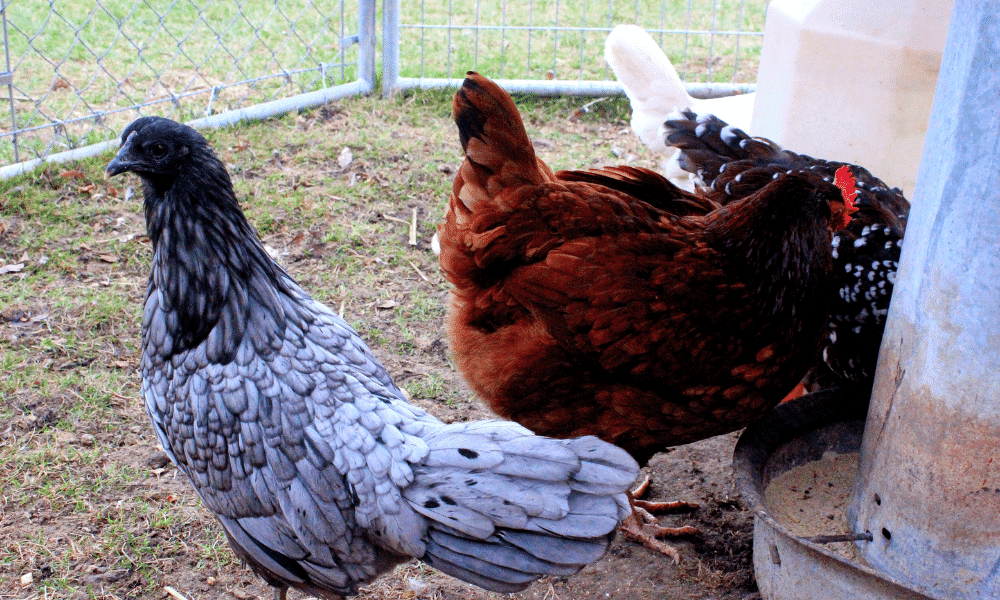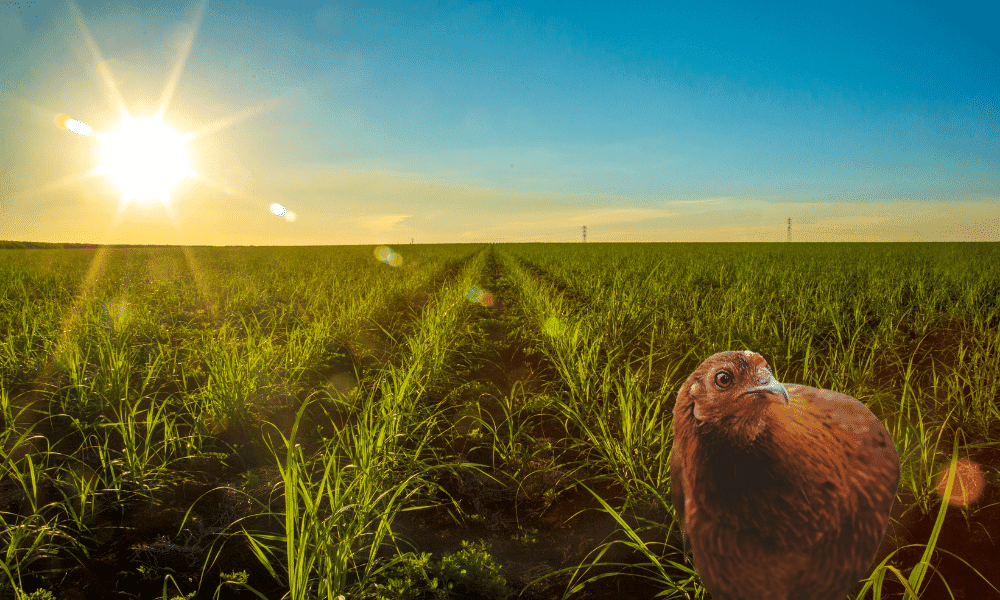Although it’s not likely you’re going to go ahead and feed your chickens pure sugar, you’d be surprised at how much sugar is actually in foods that we commonly feed to chickens, including fruits or vegetables.
But surely if it’s in other foods like fruits it’s OK to feed it to your chickens, right?
Here’s whether chickens can have sugar, what’s safe and what’s not, and what sugar actually does to chickens.
Can Chickens Have Sugar?
Firstly, just to clarify, you should never simply feed your chickens raw sugar, such as a sugar cube for example. There are simply no health benefits for your chickens by eating these sugars.
However, sugar in and of itself isn’t toxic to chickens. So if your chickens do ingest food with sugar in it there in normal amounts there shouldn’t be anything to worry about.
Nonetheless, it’s important to be conscious of how much sugar your chickens are actually eating, whether it’s from fruits in the backyard or part of a vegetable mix you’re feeding your chickens weekly. This is because too much sugar can have very serious impacts on your chicken’s health and wellbeing.
But, it is safe for chickens to consume small amounts of fruits, even though they may be high in sugar, as in this case, it’s natural sugar, non-refined, and the fruits also come with many other vitamins and minerals that are beneficial for your chicken’s health, such as blueberries, loquats, mangos, etc.
What Does Sugar To Do Chickens?
Just like with humans, too much sugar can lead to some very real effects on your chickens. Besides that, sugar itself offers no nutritional value for your chickens.
In fact, too many sugary treats in your chicken’s diet can lead to obesity, lead to overheating or heat exhaustion, and make it difficult for your hens to lay eggs. In low amounts, these impacts are not often seen, but it’s still important to be conscious of what sugar can do to your treasured chickens.
Sugar Can Lead Overweight Chickens
As we know sugar is incredibly high in calories or energy. Not only that but simple sugars, like what you will find in sweets and artificial sugars contain much less nutritional value than complex sugars, from fruits and vegetables for example.
If chickens consume too much sugar and don’t burn off the extra energy they will inevitably gain weight. Overweight chickens are at a higher risk of developing health problems, suffer from heat stress, and due to the various impacts it has, ends up laying fewer eggs.
However, it’s not natural for your chickens to overindulge in sugar. Luckily, even if you try to feed them an abundance of sugary fruits they aren’t likely to eat an amount that would put them at immediate risk.
Nonetheless, if you continuously feed them sugary treats your chooks are more likely to become overweight or develop health conditions such as fatty liver hemorrhagic syndrome.
May Cause Heat Exhaustion
Another downside to the regular ingestion of sugar in chickens is the rising potential of suffering from heat exhaustion. Of course, this can be a natural result of being overweight, as the extra weight will make it difficult for a chicken to regulate its body temperature.
However, sugar also dehydrates chickens (but not usually in fatal amounts) but it can lead be a contributing factor to heat exhaustion.
In saying that, in small amounts, sugar can actually INCREASE hydration (like when used in electrolyte drinks).
If you notice the signs your chickens are too hot, be sure they have fresh cold water and plenty of shade.
May Impact Egg Production
As we know, chickens will go ahead and eat almost anything that’s presented to them – both good and bad.
If a chicken deviates from its normal diet of layer pellets or an approved seed mix, it will more likely have difficulties laying eggs. This is because chickens need adequate protein, calcium, and other vitamins and minerals to continuously produce and lay eggs.
Sugar can impact egg production in a few different ways. Firstly, by contributing to weight gain and other related stresses. But also directly, as the more sugar they eat, the less of their other food they will consume.
So, although moderate amounts of sugar in chicken-safe foods is absolutely OK, you don’t want to let them overindulge. This goes for any other food group you feed your chickens too.
Is Sugar Unhealthy For Chickens?

In moderation, it’s hard to say if sugar is actually unhealthy for chickens. But, it’s easy to say that sugar is NOT healthy for chickens in any amount.
However, in my experience and with input from the chicken owners’ communities, a small amount of natural sugar in your chicken’s diet won’t hurt at all.
For example, chickens eating wild strawberries is completely OK, but chickens eating cinnamon rolls – not so much.
It’s also important to note that it’s not recommended to feed your baby chicks any form of high-sugar foods, even berries. This is because these stages of a young baby chick’s life are vitally important for their development.
Can Chickens Eat Sugary Fruits?
The consensus is, chickens can have a small amount of sugar in their diets, especially if it’s coming in the form of natural sugar.
Natural sugars are like those found in fruits. Feeding fruits to your chickens in moderation is entirely healthy, so long as you ensure they are also consuming at least 90% of their diet from their normal feed as it’s formulated to cover all their dietary requirements.
When fed in moderation, your chickens won’t suffer any consequences from the sugar and will benefit from a variety of different vitamins and nutrients to bolster their immune systems, health, and wellbeing.
Therefore it’s completely safe to feed your chickens small amounts of:
- Apples (except don’t feed your chickens apple cores!)
- Bananas
- Blueberries
- Watermelon
- Strawberries
- Mangos
- Plum
- Peaches
- Nectarines
- Dried Fruits
Can Chickens Eat Sugar Cane

Sugar cane is a surprisingly versatile food, being eaten by common farm animals like horses, goats, and cows. But, if you’ve ever felt sugar cane you’ll know it’s actually very tough and fibrous.
For this reason, chickens won’t actually be able to consume sugar cane – it’s simply too tough for them as they don’t have teeth to chew and break it down effectively.
If your chickens do eat a small amount of sugar cane they are most likely going to be OK. But sugar cane in high amounts, because of how tough it is, can lead to crop impaction which can be severe.
In Conclusion
So, just like sugar isn’t necessarily healthy for humans, the same can be said for chickens and other animals too.
However, chickens can eat sugar, but only as an occasional treat, and it should be always in its most natural form. Avoid feeding your chickens any sugary treats, sweets, bread, pastries, desserts, etc.
Stick with feeding them fresh fruits, and only as a supplement for their normal feed. After all, a healthy chicken is a happy chicken.
